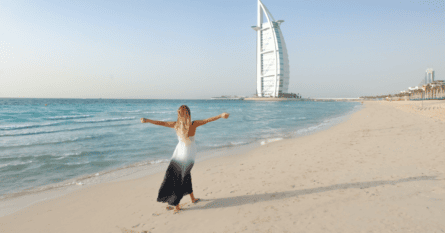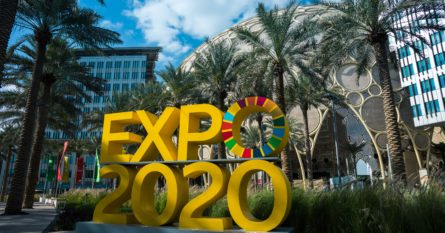Estimated reading time: 7 minutes
Dubai, famous for its opulence and grandeur, is also making significant strides toward sustainability and environmental responsibility. Read on to discover how this city is paving the way for a greener future.

Dubai has long been known for its ambitious and innovative construction projects, as well as its luxurious lifestyle. However, in recent years, the city has also become a leader in sustainability, recognizing the importance of preserving the environment and natural resources for future generations. In this article, we will review some of the city’s efforts to become more environmentally friendly.
Dubai Clean Energy Strategy
In 2015, the Dubai government launched the Dubai Clean Energy Strategy, which aims to make the city one of the world’s most sustainable cities by 2050. The strategy includes several ambitious targets and consists of five main pillars: infrastructure, legislation, funding, building capacities and skills, and environment-friendly energy mix.
The infrastructure pillar includes initiatives such as Mohammed Bin Rashid Al Maktoum Solar Park, which is the largest generator of solar energy in the world from a single location with a capacity to produce 5,000 MW by 2030 and a total investment of AED 50 billion.
The legislation pillar focuses on the establishment of a legislative structure supporting clean energy policies. The funding pillar includes the establishment of the Dubai Green Fund worth AED 100 billion which will contribute through its financial resources easy loans for investors in the clean energy sector in the emirate at reduced interest rates.
The fourth pillar aims to build human resources capabilities through global training programs in the field of clean energy in cooperation with international organizations and institutes such as the International Renewable Energy Agency (Irena) as well as international companies and R&D centers.
The fifth pillar is focused on creating an environment-friendly energy mix comprising solar energy (25 percent), nuclear power (7 percent), clean coal (7 percent), and gas (61 percent) by 2030. The mix will gradually increase the employment of clean energy sources to 75 percent by 2050, making Dubai the city with the least carbon footprint in the world.
Green Buildings
The concept of Green Building refers to the method of constructing a built environment that is efficient in terms of its use of resources such as energy, water, and materials. This is achieved by reducing building-related impacts on human health and the environment throughout the building’s life cycle, from the initial design and construction phases to its operation, maintenance, change of use, and eventual deconstruction. The key to achieving this goal is through the use of better siting, design, and construction practices that promote resource efficiency and environmental sustainability.
In January 2011, the Dubai Municipality implemented the Dubai Green Building Regulations and Specifications as the first step towards realizing the sustainable development strategy. These guidelines provide a framework for constructing sustainable buildings that use renewable energy sources, reduce water consumption, and minimize waste. The regulations were initially mandatory for governmental buildings and optional for private ones.
After the construction of 44 green governmental buildings, in March 2014, the Dubai Municipality took a second step by mandating green building regulations and specifications for all new buildings in the city. This means that all new buildings in Dubai are now required to follow sustainable construction practices to reduce their environmental impact.
Dubai has also been promoting the use of green building technologies to reduce energy consumption and carbon emissions. One notable example is the Dubai Frame, a landmark building in the city that uses innovative design to reduce energy consumption. The building is constructed in a way that maximizes natural light and ventilation, reducing the need for air conditioning and artificial lighting.
Sustainable Tourism
As a popular tourist destination, Dubai has recognized the importance of sustainable tourism. According to the World Tourism Organization, sustainable tourism refers to a type of tourism that considers both current and future economic, social, and environmental impacts, and aims to satisfy the needs of visitors, industry, the environment, and host communities. This approach seeks to balance meeting the present demands of tourists and host communities with preserving and improving opportunities for the future.
The Dubai Sustainable Tourism initiative is a public-private partnership that aims to support the broader clean energy and sustainable development goals of the city. The program is built on three core pillars: economic sustainability, social sustainability, and environmental sustainability.
The initiative seeks to reduce the environmental impact of tourism in Dubai, promote social inclusivity and cultural awareness, and support the local economy. The program involves a range of activities, including training and certification programs for tourism stakeholders, promoting sustainable tourism practices to visitors, and supporting the development of sustainable tourism infrastructure in the city. With this initiative, Dubai Tourism is committed to building a more sustainable and responsible tourism industry in Dubai, while preserving the city’s unique cultural and natural heritage.
Dubai is also home to several eco-tourism destinations, such as the Dubai Desert Conservation Reserve, which is dedicated to the conservation of the Arabian Desert’s unique flora and fauna.
Sustainable Transportation
Dubai has made significant strides in promoting sustainable transportation, intending to reduce carbon emissions and improve air quality. The city has introduced a fleet of hybrid taxis and electric buses and plans to have 20% of all trips in Dubai made by autonomous vehicles by 2030.
Moreover, there are plans to enhance the infrastructure, expand the use of clean energy to cover buildings and facilities, and promote the recycling of the waste in support of a circular economy.
Additionally, the Dubai Metro, which was launched in 2009, is a fully automated and driverless metro system that runs on electricity, reducing carbon emissions and congestion on the roads. The system is also powered by a mix of clean energy sources, including solar power.

If you’re visiting Dubai and need to get around the city in style, while still respecting mother nature, it worths to download the Blacklane app to book a ride that produces zero emissions. Since 2017, all of our rides have been automatically carbon-offset and now we’re working on offsetting all of our carbon emissions back to our founding in 2011. Plus, electric vehicles are incorporated into our offerings.
Waste Reduction and Recycling
Dubai, being a rapidly developing city with a high population density, generates a substantial amount of waste every day. The government of Dubai recognizes the importance of waste reduction and recycling to minimize the environmental impact of this waste. To that end, the Dubai Municipality has taken several measures to encourage waste reduction and recycling.
One of the main initiatives taken by the Dubai Municipality is the introduction of a comprehensive recycling program. The program is aimed at promoting the separation of recyclable waste at the source, and encouraging residents to recycle paper, plastics, and other materials. The municipality has installed recycling bins in various locations throughout the city, making it easier for residents to recycle. The recycling program has been successful in diverting a significant amount of waste from landfills and reducing the environmental impact of waste disposal.
In addition to the recycling program, Dubai has also established the Waste-to-Energy Project. This innovative project involves converting municipal solid waste into electricity, which helps to reduce the amount of waste that ends up in landfills. The Dubai Waste Management Centre (DWMC) will process 1.9 million tonnes of waste annually, making it the world’s largest operational capacity. Once completed, the project will generate enough renewable energy to power 135,000 homes. The project is on track to meet its timeline, with the first phase set to be completed by 2023 and the entire project by 2024. By contributing to Dubai Municipality’s strategic objective of diverting waste from landfills, the project is a significant step towards achieving the goal of a more sustainable and environmentally friendly city.


